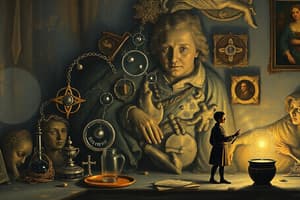Podcast
Questions and Answers
What is an essential characteristic of a scientific theory?
What is an essential characteristic of a scientific theory?
- It must be testable and falsifiable. (correct)
- It should align with popular opinion.
- It must be accepted by all scientists.
- It must be based solely on anecdotal evidence.
Which law of thermodynamics states that energy cannot be created or destroyed?
Which law of thermodynamics states that energy cannot be created or destroyed?
- Second Law of Thermodynamics
- Third Law of Thermodynamics
- First Law of Thermodynamics (correct)
- Newton's Law of Motion
Which type of cell contains membrane-bound organelles?
Which type of cell contains membrane-bound organelles?
- Eukaryotic cell (correct)
- Prokaryotic cell
- Bacterial cell
- Viral cell
Which biomolecule is primarily responsible for storing genetic information?
Which biomolecule is primarily responsible for storing genetic information?
What is a characteristic feature of isotopes?
What is a characteristic feature of isotopes?
Flashcards are hidden until you start studying
Study Notes
The Principles of Science
- Science relies on empirical evidence and testable hypotheses.
- Key principles include observation, experimentation, and logical reasoning.
- Scientific knowledge is dynamic and self-correcting.
Falsifiability
- A statement is considered scientific if it can be proven false.
- Falsifiability distinguishes scientific claims from non-scientific ones.
- Important for testing hypotheses rigorously.
The Scientific Method
- Sequence of steps: observation, hypothesis formulation, experimentation, analysis, and conclusion.
- Fosters systematic investigation and repeatability of results.
- Iterative process—results can lead to new hypotheses.
The Reproducibility Crisis
- Growing concern over the inability to replicate findings in many scientific disciplines.
- Highlights issues with research methodology and statistical analysis.
- Calls for improved rigor in experimental design and reporting.
Scientific Theories
- Theories synthesize a wide range of observations and experiments.
- Unlike hypotheses, theories have extensive supporting evidence.
- Examples include the theory of evolution and quantum theory.
Scientific Literature
- Includes peer-reviewed articles, books, and conference proceedings.
- Essential for disseminating research findings and advancing knowledge.
- Critical to assess credibility, methodology, and results before acceptance.
Basic Physics
- Fundamental principles include laws of motion, energy, and thermodynamics.
- Key concepts include force, mass, acceleration, and momentum.
- Advances in physics have led to technologies like electricity and magnetism applications.
First Law of Thermodynamics
- Energy cannot be created or destroyed, only transformed.
- Total energy in a closed system remains constant.
- Implications for heat transfer and conservation laws.
Second Law of Thermodynamics
- Entropy in an isolated system tends to increase over time.
- Heat naturally flows from hot to cold regions.
- Establishes directionality in energy transformations.
Basics of Chemistry
- Focuses on matter, its properties, composition, and reactions.
- Elements are pure substances; compounds consist of two or more elements.
- Atoms are the basic units; understanding structure and behavior is essential.
Bonding
- Types include ionic, covalent, and metallic bonds.
- Bonding influences compounds' properties and reactivity.
- Electronegativity plays a crucial role in determining bond type.
Carbon
- Unique element with the capacity to form four covalent bonds.
- Foundation of organic chemistry; critical for biomolecules.
- Exists in several allotropes, such as graphite and diamond.
Isotopes
- Variants of elements with the same number of protons but different neutrons.
- Stable and unstable isotopes; unstable isotopes are radioactive.
- Used in dating methods and medical applications.
Carbon Isotopes and C-14 Dating
- C-14 is a radioactive isotope used for dating organic remains.
- Process relies on the predictable decay rate of C-14 over time.
- Effective for dating materials up to about 50,000 years old.
Water
- Essential for life; has unique properties like high heat capacity and solvent abilities.
- Polarity allows for hydrogen bonding, creating cohesion and adhesion.
- Vital for biochemical reactions and cellular processes.
Biomolecules
- Macromolecules essential for life: carbohydrates, lipids, proteins, and nucleic acids.
- Serve as building blocks for cells and energy sources.
- Involved in key biological functions and pathways.
Carbohydrates
- Composed of sugars and starches; primary energy source for organisms.
- Classified as simple (monosaccharides) or complex (polysaccharides).
- Play a critical role in cell structure and signaling.
Lipids
- Hydrophobic molecules including fats, oils, and steroids.
- Important for energy storage, membrane structure, and signaling.
- Saturated fats are solid at room temperature; unsaturated fats are liquid.
Proteins
- Composed of amino acids; perform various functions including enzymatic, structural, and transport roles.
- Shape and function determined by sequence and folding of amino acids.
- Essential for growth, repair, and regulation in living organisms.
Protein Basics
- Proteins are made from 20 different amino acids.
- Levels of structure: primary, secondary, tertiary, and quaternary.
- Enzymes are proteins that catalyze biochemical reactions.
Nucleic Acids
- DNA and RNA are central to genetic information storage and transfer.
- DNA has a double-helix structure; RNA is typically single-stranded.
- DNA replication and transcription processes are fundamental for heredity.
Cell Theory
- All living organisms are composed of cells, the basic unit of life.
- New cells arise from existing cells.
- Serves as a foundation for understanding biological functions.
Prokaryotic Cells
- Simple cells without a nucleus; include bacteria and archaea.
- Generally smaller than eukaryotic cells; have unique structures like pili and plasmids.
- Reproduce by binary fission.
Eukaryotic Cells
- Complex cells with a true nucleus and membrane-bound organelles.
- Include plant, animal, and fungal cells; larger than prokaryotic cells.
- Essential for multicellular organism functions.
Organelles
- Specialized structures within eukaryotic cells with distinct functions.
- Examples include mitochondria (energy production), chloroplasts (photosynthesis), and the Golgi apparatus (protein sorting).
- Coordination of organelles is crucial for cellular processes.
Cell Membrane
- Composed of a phospholipid bilayer with embedded proteins.
- Regulates the movement of substances in and out of the cell.
- Key role in signaling and communication between cells.
Endoplasmic Reticulum
- Two types: rough ER (with ribosomes, synthesizes proteins) and smooth ER (lipid synthesis and detoxification).
- Network of membranes that aids in processing and transporting biomolecules.
- Important for maintaining cellular homeostasis.
Ribosomes and the Site of Protein Synthesis
- Ribosomes are molecular machines that translate mRNA into proteins.
- Found either free in the cytoplasm or attached to the rough ER.
- Critical for cellular function and growth through protein production.
Studying That Suits You
Use AI to generate personalized quizzes and flashcards to suit your learning preferences.




